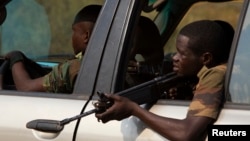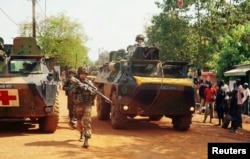A rebel leader in the Central African Republic has called for independence in the north and says much-awaited elections this month should be canceled. While transitional authorities in the C.A.R. are brushing off the call for secession, it underscores the depth of the crisis in the area and the years of international military engagement that may still be needed.
Government spokesperson Reggy Nzoukeita insists elections, which began Sunday with a constitutional referendum, will take place in all regions. The presidential and parliamentary votes are scheduled for December 27.
Just because the rebels are making a lot of noise, Nzoukeita said, that doesn't mean they can have their way. Independence is not something we can accept, he added, saying that with the help of the international forces, the government will retake control of all the territory.
Rebel operations
The national army crumbled in early 2014 as the now-dissolved Seleka rebel coalition from the north seized control of the country. Even today, no government officials and few civil servants are present in the parts of the north and east that remain under rebel control.
On Tuesday, a spokesman for rebel leader Noureddine Adam, an ex-defense minister under Seleka who is now headquartered with his men in the northern town of Kaga Bandoro, called for autonomy, followed by full independence.
The U.N. mission was quick to denounce this latest rebel call for autonomy. But well-armed groups like Adam's have operated in the northern and eastern C.A.R. for years with impunity.
International troops, in particular the French, are the only thing keeping rebels in check at the moment, says Central Africa expert Roland Marchal of the Sciences-Po university in Paris.
"What we know is that France has been eager to reduce its troops on C.A.R.,” Marchal said. “Right now, [Operation] Sangaris [includes] up to 900 soldiers. The French government would like to get that number down to maybe 600, if possibly even less, 400. So that means that the international military contingent will be much less powerful in one year than it is today."
French and regional troops were deployed to the C.A.R. in late 2014 as the Seleka were chased from power and intercommunal killing broke out that pitted Christians against Muslims, ultimately killing thousands. There are currently 9,000 U.N. peacekeepers in the country.
Once a new government is elected, insiders say rebuilding the national army could take years.





